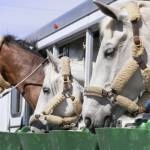Maintaining Health in Transported Horses

It’s a rare horse that hasn’t been transported at some time in its life. Changing owners, competing in a show, going to a trail ride, traveling to be bred, working with a trainer, and moving from one racetrack to another are all situations that require the horse to be moved, usually by trailer or truck but sometimes by airplane. Most horses learn that being transported is not a big deal, but just because they accept travel with outward calm does not mean they don’t feel stress as a consequence of the experience.
Consider these facts:
- Researchers have identified at least 25 different physical, psychological, and environmental components of travel that can create stress in horses.
- Aside from humans, horses are the second most common creatures to be transported by air.
- During a long flight or extended road trip, a horse can easily lose 5% or more of its body weight. Most gain the weight back quickly if they are allowed to rest, eat, and drink after the trip.
Shipping fever, a respiratory infection, used to be quite common in horses that had been transported for more than a few hours. It is less frequently seen now that owners have learned that horses should be allowed to lower their heads as they travel. This posture allows natural drainage of fluids, dust, and bacteria from the respiratory passages, minimizing the risk of infection. Even if horses travel with their heads unrestricted, they should be watched for signs of respiratory disease for a day or two after arriving at their destination.
Some amount of dehydration is hard to prevent, even if water is offered at intervals. Horses often just won’t drink during transport or at rest stops. If a horse refuses to drink at the beginning of a rest stop, water should continue to be offered at intervals throughout the break. Bringing water from home and offering it in a familiar bucket may get better results. Some owners begin flavoring the horse’s drinking water with a small amount of apple juice or flavored drink mix a week or so before the trip. The horse may accept this flavored water when it refuses other liquids during transport.
Even if horses are given hay to eat as they travel, they probably will not consume as much during the trip as they would ingest at home in a stall or at pasture. On an extended trip, this lack of gut fill can lead to mild abdominal discomfort.
Horses that travel frequently may not show outward signs of anxiety as they are loaded into a trailer, but research has shown that their level of cortisol, a hormone related to stress, continues to rise as a trip progresses. Elevated cortisol levels tend to impact the horse’s immune system, making him more susceptible to disease. Horses also have some muscle fatigue related to maintaining their balance and absorbing the constant vibration of the trailer or truck. Strange noises, a change from routine, and being alone or in the company of unfamiliar travel companions are all sources of stress. Owners may not be able to avoid these stressful factors, but they can minimize them by keeping trailers in good repair, sending a well-known buddy with a young, inexperienced, or nervous horse, choosing a quiet travel route rather than a busy expressway, and stopping for a rest every three to six hours on a long trip. Horses should not be unloaded during daytime rest stops, but on a multi-day trip they will benefit from spending night hours in stalls or paddocks.
Good air quality is a factor that is important in keeping transported horses healthy. Ventilation is important in trailers, even in cold weather. When horses stand with their heads near hay nets, they are in a position to be continuously inhaling dust and mold spores. Dampening or soaking the hay minimizes dust for a while, though it can encourage mold if the weather is hot and trips are long. Steaming hay is another method for reducing dust and studies have shown that this also reduces potential causes of infection. Another factor in air quality is the exhaust from vehicles. Trucks and trailers should be inspected regularly to be sure the exhaust system is in good condition and there are no holes in trailer floors. On extended trips, urine-soaked bedding should be removed and replaced with clean material at least once in every 24-hour period so that fumes from the breakdown of waste materials don’t irritate the horse’s respiratory tract.
At the end of the trip, horses should be unloaded, examined for signs of illness or injury, and then allowed to rest in a stall or paddock for several hours. A half-hour of hand-walking and grazing will help horses stretch and relax before they are put in stalls. Owners should provide plenty of hay and water and should watch for normal intake and also manure production. Grain can be offered after a few hours, with several smaller meals being preferable to a large grain feeding. If a horse refuses to eat or drink, doesn’t pass manure within two or three hours, or shows signs of illness or discomfort, a veterinarian should be consulted. It may take horses several days to regain lost weight and fluids after an extended trip. Signs of illness also might not be seen immediately, so horses should be checked for normal temperature, pulse, and respiration for a day or two following travel.








